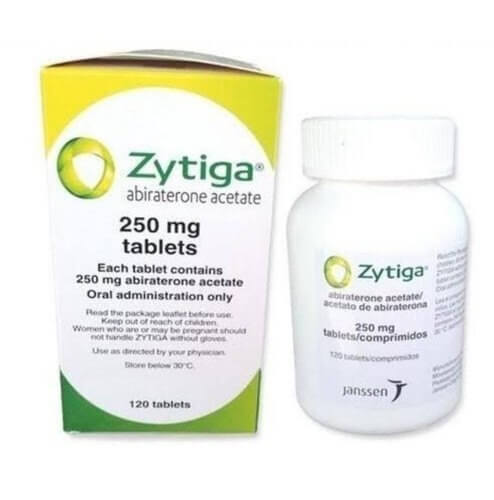Zytiga (abiraterone) is prescribed for use in combination with prednisone for metastatic high-risk castration-sensitive prostate cancer (CSPC) in men. Abiraterone belongs to the class of drugs known as anti-androgens (or anti-testosterones). Abiraterone works by blocking the production of testosterone, which is a natural hormone that can help prostate cancer to spread (become metastatic).
Prednisone is a corticosteroid that suppresses adrenocorticotropic hormone (ACTH), administered in order to reduce side effects of abiraterone, such as hypertension, hypokalemia, and fluid retention.
Dosage
The dosage and regimen will be determined by the doctor. Zytiga must be taken on an empty stomach (at least two hours after eating), and no food should be consumed for at least one hour after the dose is taken.
Zytiga is taken once daily, and prednisone is taken twice daily according to the physician’s instructions. In the event of a missed daily dose, the normal dose should be taken the following day. Do not double-dose to make up for a missed dose. If more than one daily dose is skipped, inform a healthcare provider.
Sexually active men must take precautionary steps if their partner is pregnant or becomes pregnant during the course of treatment and for one week after treatment ceases.
This text is for informational purposes only. Please consult with a doctor or pharmacist before using any medication.
This medication has been prescribed because a healthcare provider has judged that the benefits are greater than the risk of side effects. Many people using this medication do not have serious side effects.
The most common side effects of Zytiga include:
- Edema (swelling of legs or feet)
- High blood pressure
- Urinary tract infection
- Diarrhea, indigestion
- Chest pain
- Irregular heartbeat (atrial fibrillation), heart failure, rapid heart rate
- Bone fractures
- Blood in urine
- Weakness
- Joint swelling or pain
- Hot flushes
- Bruising
Not all side effects are listed here. If these or other unlisted symptoms persist or worsen, consult with a healthcare provider or pharmacist.
Some more serious side effects of Zytiga can include muscle weakness, muscle twitches, or heart palpitations. These may be a sign of low blood potassium levels. If any of these symptoms occur, stop taking the medicine and refer back to the doctor as soon as possible.
Zytiga is used to treat men diagnosed with prostate cancer that is resistant to medical or surgical treatments that aim to lower testosterone levels, and that has spread to other parts of the body (metastasized). It is prescribed along with prednisone.
Metastatic castration-sensitive prostate cancer accounts for approximately 3% of all new prostate cancer diagnoses in the US. Previously, androgen deprivation therapy was the standard of care. Although the majority of patients have a beneficial initial response, most men with metastases have progressed to castration-resistant prostate cancer within approximately one year.
Abiraterone in combination with prednisone has been shown to significantly increase overall survival and provide an additional potential role for inhibiting extragonadal androgen biosynthesis before the emergence of castration resistance in men with newly diagnosed metastatic CSPC.













